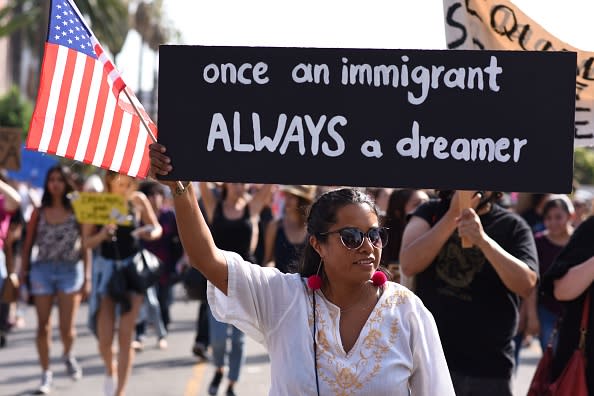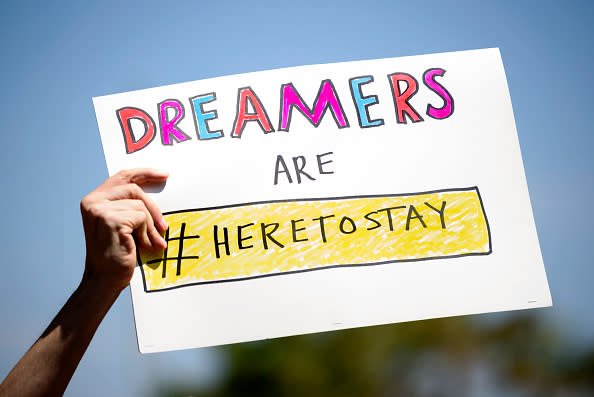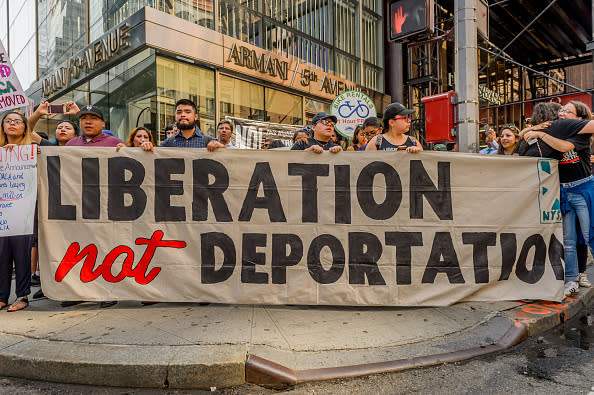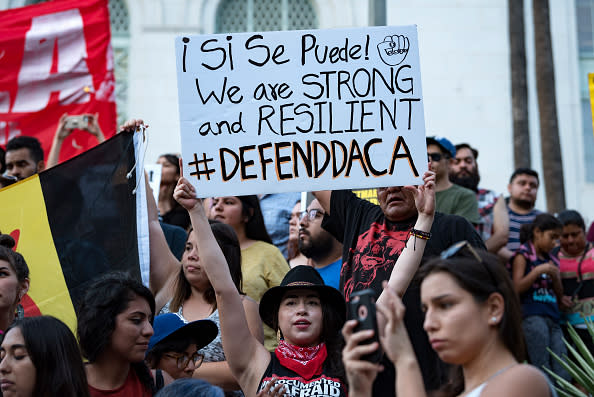A letter to DACA recipients who sometimes forget they don’t need to be “perfect” to be respected

To DACA recipients, past and present:
I have been an activist for undocumented and queer rights for three years. I’ve only been an activist for three years because, three years ago, I realized I was queer. That’s when I finally felt empowered enough to discuss my experiences as an undocumented person. Before I say anything else, I want to tell you I’m sorry that I did not remain a DACA recipient during these scary times.
***
In June 2012, I was sitting in a classroom for a financial literacy course for low-income students. In that moment, President Obama announced his executive order for Deferred Action for Childhood Arrivals, or DACA. It wasn’t a path to citizenship; it was simply a work permit. But for my family, that was enough. The DACA program meant that I was exempt from deportation for two years only — but I had the option for renewal every two years. I received my card for DACA in August 2013, one week before I began my studies at The University of Texas at Austin.
I was so excited because I could finally work regular jobs; no more babysitting or helping plan events to get by. I’d held all my jobs legally and paid taxes, but with DACA, I finally had the chance to be a regular college kid applying to the same jobs as everyone else. First, I worked as peer mentor for a nonprofit organization. Then, I canvassed for state representatives during their election campaigns. Next, I worked as a cashier at a fast food restaurant. At some point, I was working three jobs to support myself and my brother as we both were in college. I was working 40 hours a week with 16 hours of coursework — and surprisingly, that’s the most energized I’d ever felt.
Because of this work permit, I was doing something that made me feel productive and empowered as I provided for myself and my family.
Fast forward to my last semester at The University of Texas at Austin as a Mexican-American Studies major. As I prepared to graduate, I started imagining what my life would be like after the ceremony. I wanted to secure a good job while saving up enough money to get my MBA — but the threat of DACA’s removal grew with Donald Trump’s rise to the presidency. I knew that my plans may need to shift.
I was at risk of being deported to the country of my birth, and removed from the only country I call home. I cried constantly after the election. Then, my undocumented father got into legal trouble.
My partner and I had already been together for four years, so we had a very serious discussion. Even though my fears were sometimes hard to hear, my partner always listened.
We’d always known that our relationship was meant to eventually become a marriage. Now we wondered whether to speed things up to ensure I’d remain in the U.S. with him.
On February 6th, 2017, I married the love of my life at the Multicultural Engagement Center at UT Austin with my closest friends and chosen family in attendance. It was beautiful in its own way, despite the darkness looming over it.
And yet, I still felt heartbroken for months afterwards, as if something had been taken from me. I no longer got to choose whether or not I’d marry before graduating from college. I had always wanted to get my diploma first, and losing that option broke me.
I don’t regret marrying the love my life, but I’m devastated that this government’s xenophobia and racism forced me to get married faster.
***
My mother, father, brother, and I are all undocumented. We arrived in this country in 2000, when I was 5 and my brother was 2. Our family’s plan wasn’t to stay in America — my dad wanted to be trained as an electrician, and then return home to start a business.
But a year later, when my sister was born, both she and my mother almost died in labor.
We had to delay our plans to return to our home country in order to care for my sister’s health.
Six years later, my sister was diagnosed with Turner’s Syndrome, a chromosomal disorder. My sister requires regular treatment, and her specific case can only be treated in limited countries across the world. Her doctor told us that Germany and the U.S. were the only safe bets. We were already in the U.S., and she was a U.S. citizen since she’d been born here — so there was no going back home for us.
Our family’s dreams of starting a business back home were shattered and our hearts broken, but we needed to prioritize the safety of my sister. She was our world — so we pushed forward.
We talked to lawyers upon lawyers, trying to adjust our status. Each one told us that there was no pathway to citizenship; my parents would have to wait until my sister was 21 years old. Then, she could petition for their citizenship. Next, our parents would petition for my brother and me. Until then, we would be undocumented, always in fear of deportation and separation from each other.
We always had a roof over our heads and food on the table, and we never feared going to the doctor. Our neighborhood was supportive of one another since we were all mostly immigrants, both documented and undocumented. My parents settled, poorly, but they tried. Knowing that he could never return home hit my father incredibly hard. He fell into a deep struggle with alcoholism and left his bipolar disorder untreated.
Then, on January 31st, 2017, my father was arrested for a traffic violation.
My mother was in the car when the cops picked up my dad that night, and I feared that my mom would be at risk for deportation too.
My partner rushed over to my apartment. He is a White American, so all he could do was listen to my pain and comfort me, unable to relate to the struggle I was going through. I was supposed to present at the Capitol the next day to speak against Texas Senate Bill 4, a law that would increase cooperation between Immigration Customs Enforcement (ICE) and local law enforcement.
I began spiraling: How could I defend myself when my family wasn’t the picture perfect undocumented family?
If something happened to my parents, I could soon end up raising two kids — my siblings — on my own. I could be deported if DACA was rescinded. I was too overwhelmed, too exhausted to defend my family against a legislature aimed at separating us when we didn’t fit into their idea of respectable.
My partner snapped me back to reality, reminding me that I am not the only undocumented person suffering. He reminded me that my father’s alcoholism and mental illness didn’t change anything — you don’t have to be “perfect” to be treated with decency. He helped me remember that my father will never deserve to be torn from us or from the home he created just because he is sick.
“You’re gonna speak out for him and other undocumented people tomorrow because it’s the right thing to do. So stop spiraling and start fighting.”
I proposed to my partner the day before I presented at the Capitol, and I married him six days later.
***
Thankfully, my father did not get deported. He is currently working on treating his bipolar disorder and his alcoholism. My mom is still working extra hours to keep our family together and financially stable. My brother, who currently has DACA, is working towards finishing his degree at Texas State. He is fighting for a DREAM Act that will let him stay in the only home he has ever known.
Post-college graduation, I am awaiting a response for my green card application. I still live in uncertainty and fear as I start truly understanding what the American Dream means for me. I’m questioning if I even have an American Dream anymore.
Here’s the thing, I’m not writing this just to give you all a glimpse into my own life as an undocumented person.
I want to let other undocumented people know that, regardless of your status, you’re allowed to be imperfect.
You’re allowed to cry, to be angry, to be desperate, to be afraid. Just don’t let those emotions hold you back.
To all of the DACA recipients who were dancing in the sun not too long ago, please know you’re loved.
You are loved in your Brown and Black skin. You are loved in your struggle. You are loved in your tears. You are loved in your anger. You are loved in your queerness. You are loved in your disabilities. You are loved for being trans. You are loved for being strong. You are loved in the ways you thrive.
You are loved in your mistakes. You are loved in your humanity.
As I gain more privilege, I promise I will continue to fight alongside you.
No matter what “success” means to you, know that you are your ancestors’ wildest dreams. They survived, and you will too.
Thank you for being who you are.
Sincerely,
Lizeth Urdiales, a former DACA recipient



